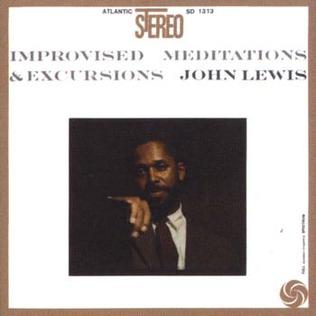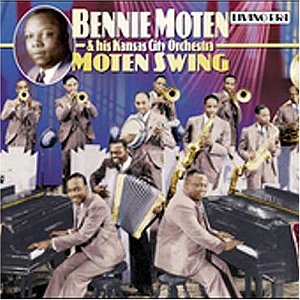Related Research Articles

Charles Parker Jr., nicknamed "Bird" or "Yardbird", was an American jazz saxophonist, band leader and composer. Parker was a highly influential soloist and leading figure in the development of bebop, a form of jazz characterized by fast tempos, virtuosic technique, and advanced harmonies. Parker was an extremely brilliant virtuoso and introduced revolutionary rhythmic and harmonic ideas into jazz, including rapid passing chords, new variants of altered chords, and chord substitutions. Primarily a player of the alto saxophone, Parker's tone ranged from clean and penetrating to sweet and somber.
A riff is a repeated chord progression or refrain in music ; it is a pattern, or melody, often played by the rhythm section instruments or solo instrument, that forms the basis or accompaniment of a musical composition. Though riffs are most often found in rock music, heavy metal music, Latin, funk, and jazz, classical music is also sometimes based on a riff, such as Ravel's Boléro. Riffs can be as simple as a tenor saxophone honking a simple, catchy rhythmic figure, or as complex as the riff-based variations in the head arrangements played by the Count Basie Orchestra.

Minton's Playhouse is a jazz club and bar located on the first floor of the Cecil Hotel at 210 West 118th Street in Harlem, Manhattan, New York City. It is a registered trademark of Housing and Services, Inc. a New York City nonprofit provider of supportive housing. The door to the actual club itself is at 206 West 118th Street where there is a small plaque. Minton's was founded by tenor saxophonist Henry Minton in 1938. Minton's is known for its role in the development of modern jazz, also known as bebop, where in its jam sessions in the early 1940s, Thelonious Monk, Bud Powell, Kenny Clarke, Charlie Christian, Charlie Parker and Dizzy Gillespie pioneered the new music. Minton's thrived for three decades until its decline near the end of the 1960s, and its eventual closure in 1974. After being closed for more than 30 years, the newly remodeled club reopened on May 19, 2006, under the name Uptown Lounge at Minton's Playhouse. However, the reopened club was closed again in 2010. Remodeling began again in 2012.
"A Night in Tunisia" is a musical composition written by Dizzy Gillespie around 1940–42, while Gillespie was playing with the Benny Carter band. It has become a jazz standard. It is also known as "Interlude", and with lyrics by Raymond Leveen was recorded by Sarah Vaughan in 1944.

Jazz at Massey Hall is a live jazz album featuring a performance by "The Quintet" given on 15 May 1953 at Massey Hall in Toronto, Ontario, Canada. The quintet was composed of five leading 'modern' players of the day: Dizzy Gillespie, Charlie Parker, Bud Powell, Charles Mingus, and Max Roach. It was the only time that the five musicians recorded together as a unit, and it was the last recorded meeting of Parker and Gillespie.
"All the Things You Are" is a song composed by Jerome Kern with lyrics written by Oscar Hammerstein II.
Confirmation is a bebop standard composed by saxophonist Charlie Parker in 1945. It is known as a challenging number due to its long, complex head and rapid chord changes, which feature an extended cycle of fifths. Jazz educator Dariusz Terefenko has pointed out the speed and intricacy of "Confirmation's" "harmonic rhythm", which he notes is typical of the bebop era.
"Barbados" is a jazz tune composed by Charlie Parker. It is a twelve-bar blues set to a mambo rhythm. Parker first recorded it on September 18, 1948, with Miles Davis (trumpet), John Lewis (piano), Curly Russell (bass) and Max Roach (drums).
Robert Lee Dunn was a pioneer Western swing steel guitarist. Influenced by influential Hawaiian lap steel guitar player Sol Hoʻopiʻi, Dunn played in his own original bluesy style and was one of the first to record an electric guitar, preceding other country & western guitarists following him shortly. He preceded by over three years George Barnes, Leonard Ware and, slightly later, Eddie Durham.
"Groovin' High" is an influential 1945 song by jazz composer and trumpeter Dizzy Gillespie. The song was a bebop mainstay that became a jazz standard, one of Gillespie's best known hits, and according to Bebop: The Music and Its Players author Thomas Owens, "the first famous bebop recording". The song is a complex musical arrangement based on the chord structure of the 1920 standard originally recorded by Paul Whiteman, "Whispering", with lyrics by John Schonberger and Richard Coburn (né Frank Reginald DeLong; 1886–1952) and music by Vincent Rose. The biography Dizzy characterizes the song as "a pleasant medium-tempo tune" that "demonstrates...[Gillespie's] skill in fashioning interesting textures using only six instruments".

Improvised Meditations & Excursions is a jazz recording by John Lewis as a solo artist, released in 1959.
"Cherokee" is a jazz standard written by the British composer and band leader Ray Noble and published in 1938. It is the first of five movements in Noble's "Indian Suite".
"Blue Bossa" is an instrumental jazz composition by Kenny Dorham. It was introduced on Joe Henderson's 1963 album Page One. A blend of hard bop and bossa nova, the tune was possibly influenced by Dorham's visit to the Rio de Janeiro Jazz Festival in 1961. The tune has since been recorded numerous times by different artists, making it a jazz standard.

Far Cry is the third album by jazz musician Eric Dolphy, released in 1962 on New Jazz Featuring a quintet co-led with trumpeter Booker Little, it is one of the few recordings of their partnership. Pianist Jaki Byard, bassist Ron Carter and drummer Roy Haynes all return from earlier Dolphy albums. This was a busy time for Dolphy- he took part in Ornette Coleman's Free Jazz session and recorded this album on the same day, and had participated in the Jazz Abstractions project the previous day.

This Is the Moment! is an album by American jazz trumpeter Kenny Dorham featuring performances recorded in 1958 and released on the Riverside label. Dorham sings on the album, for the first and only time in his discography. The album marks the recording debut of pianist Cedar Walton.

"Moten Swing" is a 1932 jazz standard by Bennie Moten and his Kansas City Orchestra. It was an important jazz standard in the move towards a freer form of orchestral jazz and the development of Swing music. Moten and his Orchestra, which included Count Basie on piano, achieved much success with it, although the song is most associated with Basie's Count Basie Orchestra, who recorded it in 1940.
"Your Mother's Son-In-Law" is a song written by Alberta Nichols and Mann Holiner that was recorded by Billie Holiday with a band led by Benny Goodman on 27 November 1933. It was Holiday's first recording. It was produced by John Hammond. The song was recorded in three takes, and Holiday was paid $35 for her performance.
"Parker's Mood" is a piece of music originally performed by Charlie Parker as an improvised blues in 1948. Vocalese lyrics were later written and recorded by King Pleasure and Eddie Jefferson.
References
- 1 2 Koch, Lawrence O. (1 January 1988). Yardbird Suite: A Compendium of the Music and Life of Charlie Parker. Popular Press. p. 27. ISBN 978-0-87972-260-9.
- ↑ Oliphant, Dave (1996). Texan Jazz . University of Texas Press. p. 128. ISBN 978-0-292-76045-5.
- ↑ Woideck, Carl (1998). Charlie Parker: His Music and Life. University of Michigan Press. p. 91. ISBN 0-472-08555-7.